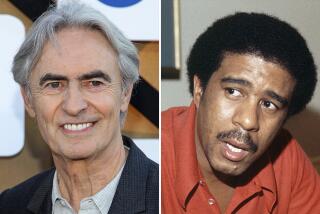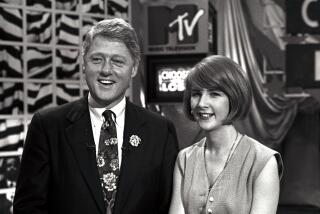YEAR IN REVIEW 1995 : Television : Putting a Muzzle on the Tube (and New Ways to Turn It Off)
Don’t talk loudly and don’t carry a big stick . . . or gun . . . or knife.
That unofficial slogan sums up the attitude of members of Congress who continued to wage war on television in 1995, bearing down on familiar targets (violence) while taking on new ones (talk shows).
The debate surrounding violence on TV quieted toward the end of the year while Congress wrestled with more complex matters in its sweeping overhaul of the nation’s communications laws. But contained in the legislation is a section that would require new TV sets to be equipped with computer technology that could block out violent, sexual or “indecent” programming.
The V-chip that lawmakers want would keep programs deemed objectionable from appearing on the screen. Because the technology requires that programs be electronically encoded with a signal that the chip could read, the legislation calls for the TV industry to create a ratings system. President Clinton has already endorsed the device, but the broadcast networks have vehemently opposed it, arguing that violence on TV has already been reduced.
A detailed, yearlong study by the UCLA Center for Communication Policy that was released in September lent credence to the networks’ defense. The study concluded that the four major networks were generally responsible in the way violence was portrayed in entertainment programs.
The report also found, however, that excessive violence was still present on theatrical films, children’s programming and on-air promotions. And the networks often failed to warn viewers in advance about violent shows, it said.
“We’ve seen some improvement since the study,” said Jeffrey Cole, director of the policy center. “There’s some improvement in the advisories and promos. We’ve certainly seen no increase in violence. We got a surprisingly good reaction from producers who felt we have some responsible things to say.”
The targeting of daytime talk shows overshadowed violence as a hot topic during the latter part of the year.
William J. Bennett, the nation’s former education secretary, and Sens. Joseph I. Lieberman (D-Conn.) and Sam Nunn (D-Ga.) launched a protest of televised talkfests that they claimed caused harm to children and debased American culture.
Bennett and the legislators said shows hosted by such personalities as Ricki Lake, Jerry Springer, Montel Williams and Jenny Jones were tawdry and exploitative. The campaign by Bennett and the senators led to pressure from advertisers and station managers around the country to tone down the shows or lose air time and ad revenue.
“There was already a backlash against these shows, but we were able to channel some of that anger,” said Dan Gerstein, a spokesman for Bennett.
How seriously the talk shows were moving in that direction was open to question, however, and Bennett said the campaign will continue in 1996:
“We will identify and expand areas where we will concentrate our attention--including, very soon, the content of advertisements themselves.”
More to Read
The complete guide to home viewing
Get Screen Gab for everything about the TV shows and streaming movies everyone’s talking about.
You may occasionally receive promotional content from the Los Angeles Times.







